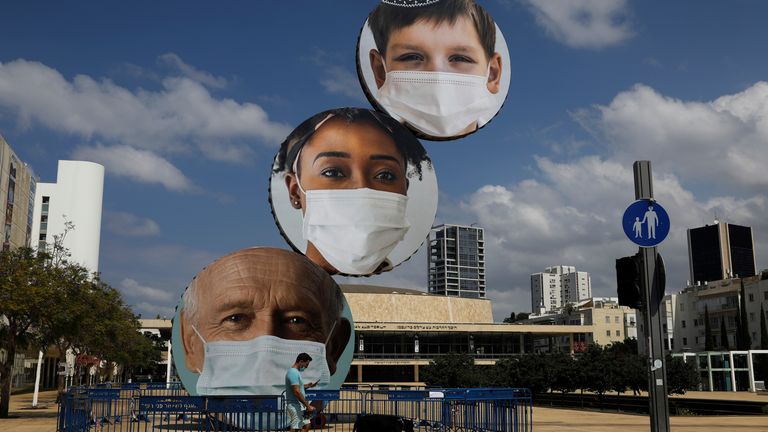Israel’s government has voted to tighten a week-old national lockdown as figures reveal the extraordinary extent of the country’s coronavirus challenge.
The cabinet met late into Wednesday night and concluded, not without huge disagreement, that a “hermetic” lockdown must be implemented by Friday.
The country’s infection rate is by far the highest among known rates globally.
Live updates on coronavirus from UK and around the world
Prime Minister Benjamin Netanyahu told minsters: “I know that it is late but in more than one sense, we are facing the moment of truth.
“The number of severe cases is rising. To my sorrow, so is the number of deaths.
“Over the past two days we have heard from the experts that if we do not take tough and immediate measures, we will reach the edge of the abyss.”
Sky News analysis of data from the Johns Hopkins University shows that Israel currently has a daily infection rate of 55 cases per 100,000 (seven-day rolling average).
This compares with Spain at 24.2, Brazil with 11.8, and the United States with 13.6.
The data also shows that Israel has had the biggest global increase in infection rates over a 14-day period. The two week infection rate doubled to 663.7 per 100,000, up by 340.5.
About 54,000 tests were administered on Wednesday and 6,808 people, 13%, tested positive. That is the highest single day positive percentage since the outbreak of the pandemic.
The country’s positivity rate is averaging 8%. The World Health Organisation (WHO) has said it should be below 5% for a country to be able to control the virus.
It took Israel a steady six months to reach 100,000 confirmed coronavirus cases. The country was praised for its initial handling of the pandemic.
Yet, just 32 days after confirming its 100,000th case, the number had doubled to 200,000.
In line with global trends, the vast majority of cases are showing minor symptoms or are asymptomatic.
However, the sheer number of cases is now overwhelming hospitals and impacting the number of medical staff who are available to treat patients.
Health ministry statistics show that among health workers nationally, cases surged from 722 on Monday to 1,697 on Wednesday. A further 4,331 medical staff are quarantined.
The existing lockdown, only imposed last week, had restricted movement to within 1km of people’s homes. However, rules for shops, businesses and places of worship were confusing, contradictory and not well enforced.
The new lockdown will come into effect at 2pm on Friday and last until at least 11 October. Only supermarkets and pharmacies will open.
Synagogues will remain open only for the Yom Kippur holiday and protests will be limited to within 1km of the demonstrator’s home in groups of 20.
Mr Netanyahu has been the focus of weeks of protests. His critics say he is trying to silence their calls for him to resign because of his handling of the crisis.
The country is struggling to implement an effective contact tracing system. The security establishment recently concluded that more than 50% of Israelis who are asked to quarantine violate their orders.
The pandemic has exposed huge fault-lines in Israel’s political and social structure.
The complex coalition government is deeply divided over the restrictions, which are set to devastate the economy.
Even the government-appointed corona tsar Professor Ronni Gamzu – who is known for his caution – took exception to the new restrictive measures.
“My recommendation was more moderate, to go for 50%,” he is reported to have told the cabinet meeting.
Prime Minister Netanyahu responded: “We make decisions by dint of our responsibility and not only based on recommendations. The recommendations that we’ve gotten up until now have led us to a surge from 2,000 patients a day to 5,000 a day.”




